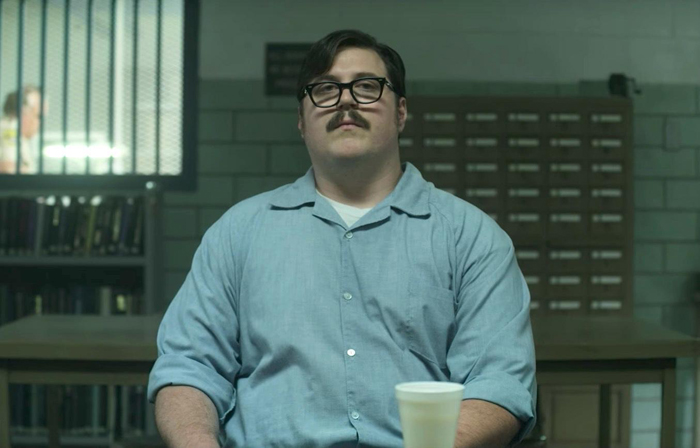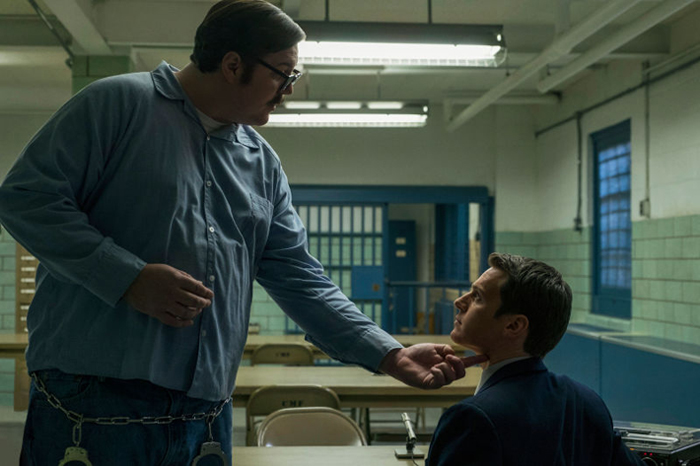And so we find ourselves between something of a rock and – if not a fully hard, than at least a largely firm – place. Because two episodes in is no time to be truly considering Mindhunter‘s bigger picture, and yet I find it very difficult to consider the episode in a vacuum. The series has an objective, and it is something deeper than a didactic retelling of the early days of criminal profiling. Something is afoot. I’m just not sure what yet.
But honestly, who cares, when the journey is so engaging? Well, I do realistically, but I also really loved this episode. Mostly due to the introduction of Ed Kemper, who is absolutely real and has a Wikipedia page worth the price of perusing. The most basic of all possible synopses of the episode is that Ford begins semi-covertly going to visit oddly affable serial killer, Ed Kemper, in the hopes of gaining greater insight into what informs men like him, via conversation of interview. Kemper proves a strange and engaging subject. He enjoys having an audience, immensely, especially one as entirely riveted as Ford proves to be. Tench initially resists, but eventually gives in to Ford’s persistent requests to join him in interviewing Kemper. Parallel to all of this, Ford and Tench attempt to help a local police force find a man who has brutalized an older woman and murdered her dog, by beginning to apply the psychology they know to the evidence they have. Tench sees the value in Ford’s work and they receive an official sanction to basically become the Mulder and Scully of Mindhunter. Work in the basement, on weekends.

Alright, so. I am reserving myself the pleasure of writing about Kemper – or, to be perhaps a bit more precise, and in doing so, less vulgar, the actor who plays Kemper – until the very end. Because we have things, you and I, that we discussed previously, that warrant revisiting. Because it is apparent that Mindhunter is of a large mind. This isn’t Criminal Minds – these episodes all serve specific function and purpose and the serialization and chronology is pivotal to the grander scheme (a scheme, it is worth nothing, I have not entirely figured out yet.) Though Holden is clearly our point of view, Bill is, for all readily definable purposes, the more likable, and make no mistake, the more human, of the two. I have discussed this show at some length with someone dear to me, whose opinion I value, and at various times we have both defaulted to referring to Holden as an alien. Jonathan Groff (who is, in every other context I’ve seen him, a funny and lively performing, engaging and charming actor) plays Holden like a blank slate, trying to imitate human form and function, and in that, he has a certain cloying desperation to be liked and approved of. It becomes quickly apparent in his interactions with Kemper that he is not simply trying manipulate the convicted killer; Holden lives alone. He has a girlfriend who barely seems of the same species as him, and a partner who fluctuates between being wryly amused by him and irritated and baffled. He is a wunderkind, who keeps himself separate by wearing variations on the same suit, every day of his life, and by being unable to turn off the work part of his brain. Kemper is the first person Holden meets who wants to talk about death and murder as badly as he does. And though they are at cross purposes, it is difficult not to feel like Holden is trying to prevent murder more out of a respect for the rules of the game than out of a true appreciation for human life. And in the security of the bond he rather rapidly develops with Kemper, Holden is allowed to blossom, a bit. He bros out. He talks like a frat boy, bragging about conquests. In perhaps the show’s most jolting but effective transition, the conversation shifts from Holden talking about the myriad notches in his bedpost and his girlfriend, to Kemper explaining how the sensation of penetrating a hole in the neck is different from oral sex. That the conversation could so easily head in that direction feels a lot like the show once again taking aim at a sort of toxic masculinity and the culture of locker room talk.

But this gives me all the impetus I’ve needed to jump right on in about Kemper. If one needs an easy analogy, he is the Hannibal to Ford’s Clarice, if Hannibal enjoyed talking about himself as much as he enjoyed eating the livers of census workers. Kemper is gregarious, affable. In a lot of ways, the last person you would expect to be a serial killer, which is part of what makes him so effectively dangerous and such a capable manipulator. I imagine that reactions will vary, as to the degree of sincerity Kemper displays in his conversations with Ford and Tench – the actor pretty brilliantly applies a certain, stilted and clipped delivery to all of his lines (and be ready for that voice; it is not what you expect to hear coming out of such a behemoth) that makes it very difficult to ascertain what is performance and what is reality. And yet, there are moments where something shifts; light goes out in his eyes, and his voice becomes hollow. And that is when it feels honest. That is when it feels real. His precise purpose or intentions in weaving a reality for Tench and Ford, I have not yet determined. Boredom seems a reasonable guess, but given the ubiquity of performative themes and the masking of the genuine self in these first two episodes, I am certain it will come into some sort of greater play.
I am going to posit here, and we can look back when all of this is done and see if there is any validity to what I am saying, that by the end of this season, we will find that Holden and Kemper are very much alike. With Holden lacking the urge to kill, but Kemper strangely more developed at human interaction. We will see. And soon!
